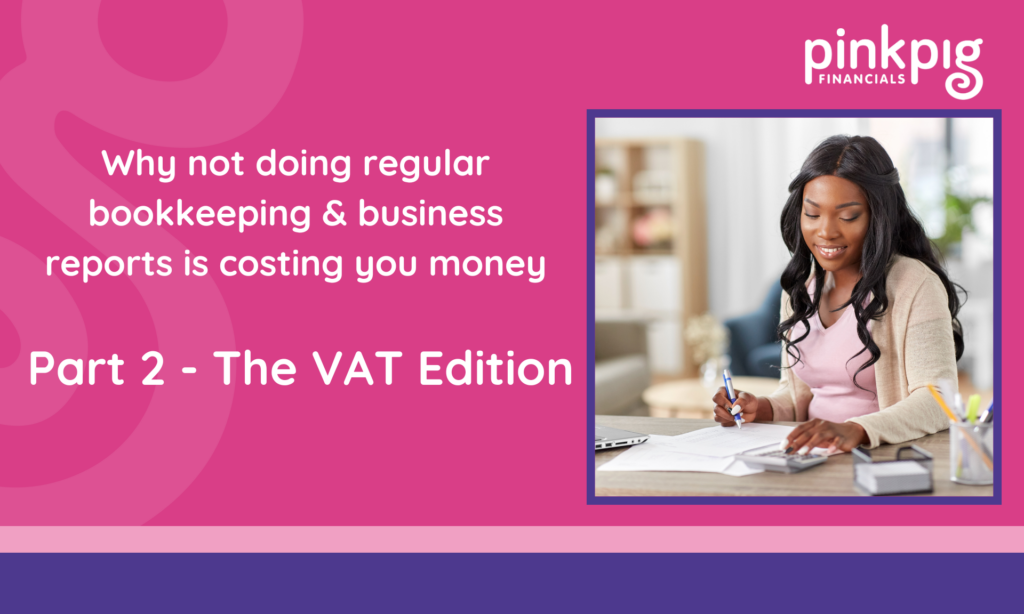Welcome to our new 5-part series on how you are probably losing money if you are not doing regular bookkeeping & reporting within your business. This is part two – The VAT Edition.
What is Bookkeeping?
Bookkeeping is essentially the financial record-keeping for your business – done properly, it will tell you everything that’s come in, everything that’s gone out, everyone who owes you, everyone who you owe, how much tax you will need to pay, and the list just goes on.
Reporting without accurate bookkeeping is about as useful as an accountant without a calculator … but – paired with good bookkeeping, checking out your business reports regularly will enable you to plan for the future, see how to scale and when and will stop you from falling into any financial pitfalls.
Now we’ve got that cleared up, let’s get into it…
Part 2 – The VAT Edition.
When starting up as a small business, that elusive VAT threshold may seem a million miles away and so you don’t give it a second thought. In case you don’t know, you must be registered for VAT once your rolling 12 month turnover surpasses £85,000. This is not the 12 months of the financial year, but just the previous 12 months. You can register voluntarily before this point, but if you cross £85k it becomes mandatory.
Oh – and just a quick one, we’re talking turnover, not profit. And these 2 numbers can be wildly different. So just because your profit isn’t anywhere near this point, doesn’t mean it’s not a good idea to check your turnover so you don’t get caught out.
For the majority of businesses, the VAT rate is 20%. That means that 20% of each sale is then owed to you-know-who…
So, it’s fairly obvious that you cannot accurately know your turnover unless your books are up-to-date. And there’s no pleading ignorance with HMRC! If you don’t realise that you’ve gone over the threshold until 6 months later, it’s kind of tough luck, you’ll still be required to pay the VAT from the time you crossed the threshold.
Knowing a good way in advance when you’re going to get there gives you time to increase your pricing, and therefore keep your level of profit the same.
Claiming Back VAT
On the plus side of being VAT registered, you can claim back the VAT on your business-related purchases. BUT. Only if you’ve got the receipt showing the amount of VAT and the VAT credentials of the supplier.
If your receipts get crumpled up in a pocket, or the bottom of a bag, or you just don’t take them, then you’ll be missing out on claiming back valuable cash into your business.
Having an app, such as Dext, on your phone where you can immediately take a picture of your receipt and then recycle it, means you won’t be missing out on anything.
De-registering for VAT
On the flip side, if you are already VAT registered, and for some reason your turnover starts to regularly fall below the threshold, you can de-register for VAT. Knowing when this has happened and getting on it quickly will save you from handing over your hard-earned cash to HMRC.
The best way to keep up-to-date and accurate is to use accounting software (sorry, but spreadsheets just don’t cut it anymore!), and get clued up on how to understand the data and what it’s telling you.
As if losing out on VAT, or having to pay more isn’t enough to convince you to keep your records up-to-date, go back and see:
or move onto
Part 3 – The Business Structure Edition.
Part 4 – The Time Freedom Edition
Part 5 – The Mind Freedom Edition
How can PPF help?
If you’d like to get some training on how to do accurate bookkeeping & reporting for yourself, or you’d like to outsource this to the experts, fill in our Quick Questionnaire here and we’ll be more than happy to help you.
For more Tax Tips & advice, check out PPF on YouTube!

